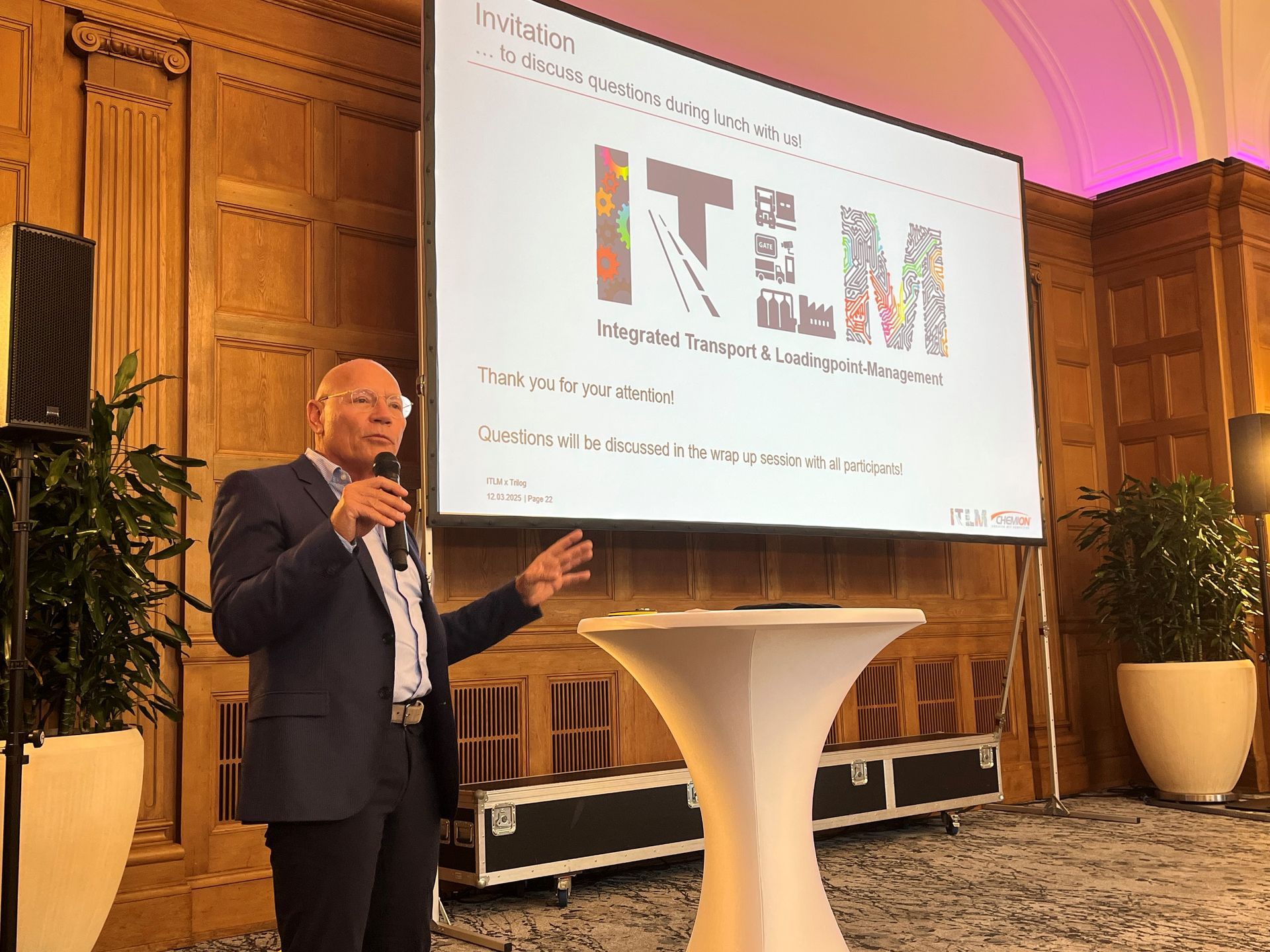Rudy Hemeleers (eFTI4EU / eFTI4ALL) focused on the state of play of the implementation of the European Freight Transport Information regulation (eFTI). He used his intervention to pinpoint the fact that not only the competent governmental authorities should prepare for eFTI, but that also shippers and carriers should make themselves aware of what’s to come when the regulation comes into effect in 2027. He called for creating a common understanding of the implementation pathway, for creating sector specific data models, for starting initial pilot projects and, potentially, for considering a common sector specific eFTI platform.
Deep dive: Pathway and challenges during the development and implementation of ITLM
The workshop was opened by Currenta’s CEO Tim Hartmann and Chemion’s CEO Christian Czauderna. Additionally, to kickstart the day, Gerd Deimel (c2i), chair of the Trilog working group on infrastructure, gave some context on the trilateral chemical strategy initiative that serves as the platform for the workshops on digitalization in logistics.
The entire day was moderated by Kurt-Peter Zoch from Chemion and Tanja Merckx (essenscia), coordinator for the digitalization activities in the framework of the Trilog infrastructure initiative.
Kurt-Peter Zoch and Matthias Gassenmeier took the participants with them on their journey to develop and implement the ITLM system and, thus, to digitize and automate site logistics processes including the handling of trucks at the central entrance gate to the CHEMPARK. The system will be applicable for all transport modes. In the future, especially in the highly connected chemical sector in the trilateral region, a shared cloud platform or at least a higher degree of interoperability between company platforms should be the target.
During the Q&A session, the participants zoomed in on the opportunity of digital collaboration leveraging the existing ECLIC platform. The existing ECLIC digital collaboration platform is today already owned by the industry and aims to drive interoperability, however, it continues to face the challenge that shippers tend to push own “point-to-point” IT solutions to logistics service providers leading to numerous and complex interfaces and extra IT costs. The path forward is to start acting as a “Trilog Verbund” who is willing to co-fund and apply industry wide Use Cases like eECD, eCMR using harmonized interfaces whereby data can be securely shared without loss of data control and ownership. Such applied Use Case digital collaboration approaches, as per ECLIC example, will further drive competitiveness in chemical logistics.
After a refreshing networking lunch, the attendees enjoyed a bus tour through the CHEMPARK with special attention to the automated check-in/check-out system at the truck entrance, an explanation of logistics processes at the port of the chemical park and an impression of the rail freight terminal.
State of play of eFTI implementation and what to do in 2025
In his testimonial Lennart Heip (DOW) explained to the audience which steps his company had already taken to become eFTI-ready. This includes evaluating if the already available electronic data is sufficient to satisfy all requirements of eFTI. Closing the gaps and talking to the data-broker will be next steps. Eventually, the data-broker needs to be able to build the “shipper-part” of the eFTI data sets that then needs to be linked with the data set of the transport undertaking to combine into a full eFTI data set.
Collaboration in the trilateral region remains key
The wrap up from Tanja Merckx and the concluding discussion with the audience focused on lessons learned from the day and experiences in the respective companies. The participants agreed strongly on the need for more best practice exchanges and stressed the huge collaboration potential in the trilateral chemical industry cluster. Sharing knowledge about established digital solutions and exchanging more standardized industry data sets can lead to their increased usage and, thus, to come to a chemical logistics network in Flanders, the Netherlands and NRW that is more interoperable, more efficient, sustainable and resilient and also of benefit for logistics operators in times of driver shortages. The already existing ECLIC community could further inspire all Trilog stakeholders and lead by example. A sector specific approach to eFTI implementation could be another valuable path forward.

Trilog intends to continue the workshop series to provide a platform that enables and sparks further cross-border cooperation.
Background on the Trilog initiative:
The TRILOG or ‘Trilateral strategy for the chemical industry’ is a cross-border cooperation between the Netherlands, Flanders and North Rhine-Westphalia. In a globally competitive environment that is changing drastically, the trilateral chemical industry faces fundamental economic, environmental and technological challenges. To prepare for the future, capture the benefits of a growing chemical industry and remove existing bottlenecks for this development, an important strategic process had been launched in 2017. North Rhine-Westphalia, the Netherlands and Flanders agreed on a joint vision on the future development of their flagship industry – the chemical industry.
Organisation and Support of Trilog workshop and site visit:




